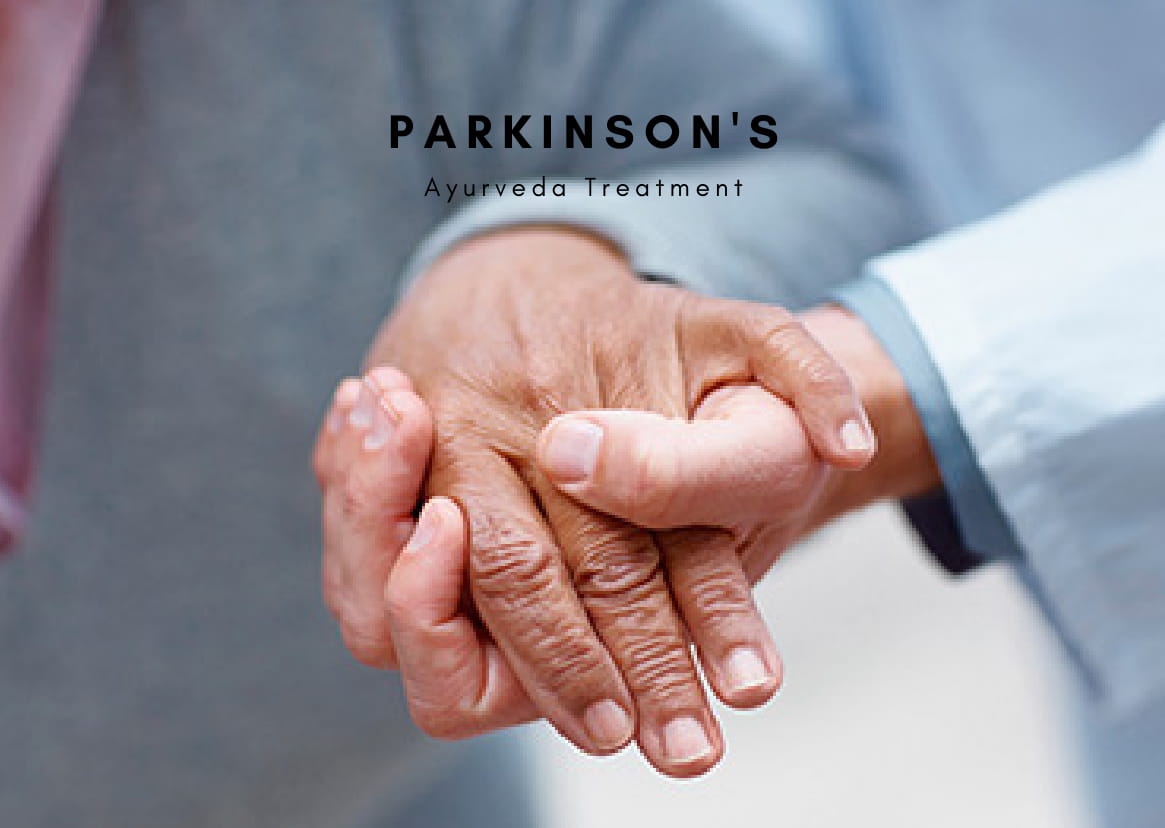Parkinsons in Ayurveda

Ayurvedic Treatment for Parkinsons in Kerala, India
Parkinson’s disease is a movement disorder. It affects the nervous system, and symptoms become worse over time.
Parkinson’s disease occurs when brain cells that make dopamine, a chemical that coordinates movement, stop working or die. Parkinson’s disease can cause tremor, slowness, stiffness, and walking and balance problems, it is called a movement disorder.
The five stages of Parkinson’s Disease are:
- Stage One: During this stage, individuals experience mild symptoms that do not interfere with daily activities. Tremor and other movement symptoms occur on one side of the body only. They may also experience changes in posture, walking and facial expressions.
- Stage Two: Symptoms become more noticeable, including tremor, rigidity and other movement symptoms on both sides of the body. The person is still able to live alone, but daily tasks are more difficult and lengthier.
- Stage Three: This is considered mid-stage. Individuals experience loss of balance and slowness of movements. While still fully independent, these symptoms significantly impair activities such as dressing and eating. Falls are also more common during this stage.
- Stage Four: Individuals may require assistance to complete daily tasks. Symptoms are severe and limiting. Individuals may stand without help, but movement likely requires a walker. People in stage four require help with daily activities and are unable to live alone.
- Stage Five: Stiffness in the legs may make it impossible to stand or walk. The person requires a wheelchair or is bedridden. Around-the-clock nursing care is needed for all activities. The person may experience hallucinations and delusions.
Causes
While there’s no known cause, a few factors increase the risk of Parkinson’s disease. These include:
- Sex: Men are one and a half times more likely to get Parkinson’s than women.
- Age: Parkinson’s usually appears between the ages of 50 and 60. It only occurs before the age of 40 in 5-10 per cent of cases.
- Family history: People who have close family members with Parkinson’s disease are more likely to develop Parkinson’s disease, too.
- Toxins: Exposure to certain toxins may increase the risk of Parkinson’s disease.
- Head injury: People who experience head injuries may be more likely to develop Parkinson’s disease.
Symptoms
Parkinson’s disease has four main symptoms:
- Tremor (trembling) in hands, arms, legs, jaw, or head
- Stiffness of the limbs and trunk
- Slowness of movement
- Impaired balance and coordination, sometimes leading to falls
The Ayurvedic Explanation
According to ayurveda, Parkinson’s disease is co-related with kampavata. Vata dosha is more predominant in the body during old age. This vata relocates in the brain and dries up the brain cells leading to tremors and instability. Parkinson’s disease reflects massive vitiation of vata which occupies almost all channels of the body. Weak digestive fire, disturbed digestion and presence of toxins (ama) are generally observed in the patient at gastrointestinal as well as cellular levels, which provide conducive environment for vitiation of vata.
Ayurveda Treatment for Parkinson’s Disease
The main Ayurveda treatment for Parkinson’s Disease are:
- Panchakarma
Panchakarma is one of the most famous treatment methods in ayurveda. The process consists of five steps for the detoxification and rejuvenation of mind and body. This treatment contains herbal massages and cleansing enemas. - Shirodhara
Shirodhara is the therapeutic administration of warm oils to the centre of the forehead in a continuous stream. Shirodhara helps calm the mind and the nervous system. It can alleviate mental and emotional stress and facilitates the unfolding of clarity and bliss. - Shodhana
Shodhana is a method of ayurvedic treatment that works on correcting the underlying root cause and treat the disease by detoxifying. It helps to purify and detoxify the whole body with the help of massages with medicated oils and herbs.
Diet Practices
Here’s a list of food to eat and avoid to help manage the symptoms of Parkinson’s disease:
- Increase the intake food with antioxidants
- Increase the intake of food with omega-3 fatty acids
- Avoid Dairy products
- Avoid food high in saturated fats
- Consume 6-8 glasses of water every day.
Ayurveda treatment for Parkinson’s Disease requires early diagnosis and long term management for avoiding long term complications. At Krishnendu Ayurveda, we have a very systematic approach in treating Parkinson’s disease; we plan a customized treatment for each individual which is specific to their symptoms.

